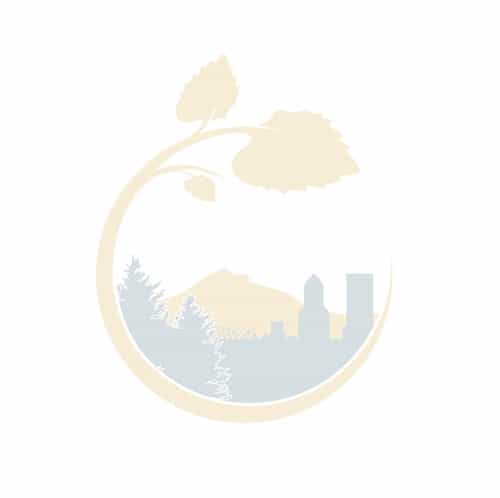


The overarching philosophy of The Cottonwood School of Civics and Science is to create a community of learners that are deeply involved in developing a sense of place.
Place-based education helps students learn a broad range of concepts by connecting them, whenever possible, with the natural and social community in which students live and learn. When students are youngest and most concrete in their thinking, Place-based education strives to delve them deeply into the community allowing them to connect their learning to tangible experiences around them. So, the youngest students community, including their home, classroom and immediate neighborhood, is the focus of their work. As they grow and become more capable of abstract thought, learning moves out in concentric geographic rings. As students grow, their community expands to include Portland, Oregon, the United States and the world beyond.
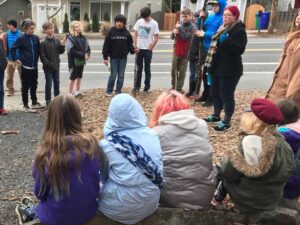 “Place-based education is the process of using the local community and environment as a starting point to teach concepts in language arts, mathematics, social studies, science, and other subjects across the curriculum. Emphasizing hands-on, real-world learning experiences, this approach to education increases academic achievement, helps students develop stronger ties to their community, enhances students’ appreciation for the natural world, and creates a heightened commitment to serving as active, contributing citizens. Community vitality and environmental quality are improved through the active engagement of local citizens, community organizations, and environmental resources in the life of the school.” (Sobel, 2004)
“Place-based education is the process of using the local community and environment as a starting point to teach concepts in language arts, mathematics, social studies, science, and other subjects across the curriculum. Emphasizing hands-on, real-world learning experiences, this approach to education increases academic achievement, helps students develop stronger ties to their community, enhances students’ appreciation for the natural world, and creates a heightened commitment to serving as active, contributing citizens. Community vitality and environmental quality are improved through the active engagement of local citizens, community organizations, and environmental resources in the life of the school.” (Sobel, 2004)
A holistic view of environment: Place-based education immerses students in their local environment by looking through cultural, social, natural lenses.
Community-building: One of the primary goals of place-based education is building healthy, sustainable communities both in and beyond school walls. Curricular goals merge with community goals. Students and educators collaborate with local partners to create meaningful projects.
Student and Civic Engagement: Students and educators apply skills and content from multiple disciplinary areas when working of projects. Integrated studies have proven to be one of the most successful strategies for increasing student engagement. Young people gain hands-on experience with leadership skills and the democratic process through civic engagement.
Diverse Perspectives: We seek and honor multiple, diverse perspectives to build a more complete and inclusive understanding of the places we live. We apply the lenses of eco- and social- justice when developing partnerships and projects.
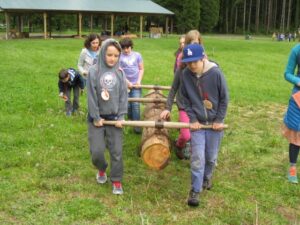 Place-based projects at the Cottonwood School are grounded in the history, environment, and people of Portland and the Pacific Northwest. Each trimester concentrates on key social studies or science concepts. Reading, writing, public speaking, and geography skills are heavily embedded into the project work. Through an integrated approach, students go deep into a topic over an extended period of time. This allows them to learn the complexities of an issue while discovering how components naturally connect with other concepts. We apply the lenses of social justice and eco-justice to all units of study.
Place-based projects at the Cottonwood School are grounded in the history, environment, and people of Portland and the Pacific Northwest. Each trimester concentrates on key social studies or science concepts. Reading, writing, public speaking, and geography skills are heavily embedded into the project work. Through an integrated approach, students go deep into a topic over an extended period of time. This allows them to learn the complexities of an issue while discovering how components naturally connect with other concepts. We apply the lenses of social justice and eco-justice to all units of study.
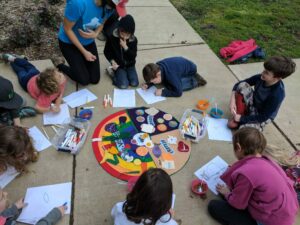 As students grow, so do to places they study. In kindergarten through second grade, students focus on family, home, school, and neighborhood. This also includes looking at local rivers, forests, and mountains. In third grade student reach further back in time to learn about the ancient history of Oregon, and in fourth and fifth grades, students learn about United States history as well as the biomes of the Pacific Northwest. Sixth through eighth grades introduce students to national and global topics while also striking a balance with local connections. For example, as student learn about globalization in the seventh and eighth grades, they visit local businesses who sell products internationally to see how global trade impacts Portland. Coordinating scope inline with a child’s evolving understanding of the world allows us to create a developmentally appropriate approach to learning about place.
As students grow, so do to places they study. In kindergarten through second grade, students focus on family, home, school, and neighborhood. This also includes looking at local rivers, forests, and mountains. In third grade student reach further back in time to learn about the ancient history of Oregon, and in fourth and fifth grades, students learn about United States history as well as the biomes of the Pacific Northwest. Sixth through eighth grades introduce students to national and global topics while also striking a balance with local connections. For example, as student learn about globalization in the seventh and eighth grades, they visit local businesses who sell products internationally to see how global trade impacts Portland. Coordinating scope inline with a child’s evolving understanding of the world allows us to create a developmentally appropriate approach to learning about place.
Our literacy and math programs support our overall place-based curriculum by giving students the skills they need to complete high-quality, authentic project work. All of our curriculum correlates with state and national standards and student learning is assessed in multiple ways in addition to standardized testing.
It is a policy of the State Board of Education and a priority of The Cottonwood School that there will be no discrimination or harassment on the grounds of race, color, sex, marital status, religion, national origin, age, sexual orientation, or disability in any educational programs, activities or employment. All students, staff, and third parties are protected by this policy, and can find complaint procedures here: Nondiscrimination Policy and Process
People having questions about equal opportunity and nondiscrimination should contact The Civil Rights Coordinator Aviva McClure, Executive Director/ Principal
640 S Bancroft Street, Portland, OR 97239
Phone 503-244-1697;
or email: avivamcclure@thecottonwoodschool.org
Additionally, our school 504 Coordinator is Kristin Krem who can be reached at kristinkrem@thecottonwoodschool.org

Randali is the parent of a Cottonwood student and feels committed to the benefits of place-based education model. Randali is passionate about accessibility, sustainability and community building in all areas of her life. She has experience as a founding board member in small grassroots non profits as well as an employee and volunteer for more established non profit and mutual aid organizations in the Portland Metro area. Randali currently works in the healthcare software field as a Product Manager focused on improving the patient experience and education.
Randali is looking forward to serve the board and contribute to strengthening the Cottonwood School community and their vision.
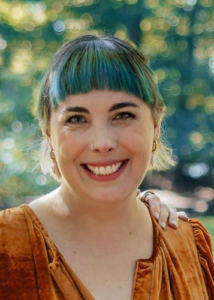
Julia Nesbitt is the parent of an elementary student at Cottonwood and is thrilled to be able to give back to the Cottonwood community by serving on the board. She brings over 20 years of experience in the travel industry, fostering a deep appreciation for cultural exchange and community. As a member of the Cottonwood School Board, Julia is excited to support the school’s dedication to place-based education, believing that connecting students to their local environment is key to fostering community action and responsibility. Passionate about compassion and equality, Julia believes in the Cottonwood community to instill these values in future generations, ensuring every child is empowered to make a positive impact in the world.
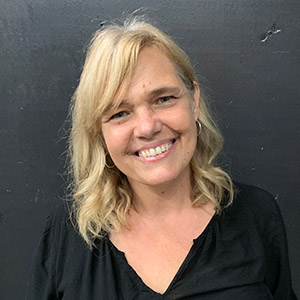 Kimberley spent ten years teaching preschool through third grade at Trillium Charter School and has spent the years since teaching grades K through 2nd.
Kimberley spent ten years teaching preschool through third grade at Trillium Charter School and has spent the years since teaching grades K through 2nd.
Kimberley is committed to relationship-based education and inclusive classroom practices. She became interested in place-based education while working with a colleague who did their student teaching at The Cottonwood School. The next year Kimberley devoted her time to a year long study with her students of Washington Park and the importance of this place to the Portland Metro community. Kimberley has a BA in Early Childhood Education and Human Development from Washington State University.
In her free time, Kimberley loves spending time with her daughters, friends and family, reading, hiking and riding her bicycle.
 I’m Abby Manzano, and I’ve loved getting to know our wonderful 2nd and 3rd graders as a co-teacher!
I’m Abby Manzano, and I’ve loved getting to know our wonderful 2nd and 3rd graders as a co-teacher!
I was born and raised in the Bay Area and moved to Portland in 2022 for new adventures. I hold a Bachelor’s degree in Political Science from San Francisco State University and a Master’s in Secondary Education from WGU. My background includes working in the West Linn-Wilsonville School District as a substitute teacher and at Zenger Farm as a summer camp educator.
Teaching is my passion, and I strive to build meaningful and empowering relationships with my students. I use hands-on, project-based learning to make education fun and engaging while maximizing each child’s potential.
Outside of teaching, I enjoy spending time in nature—gardening is my favorite pastime. I also love arts and crafts, puzzles, baking, and spending time with my pets: 4 cats, 12 chickens, and a playful dog named Cooper.
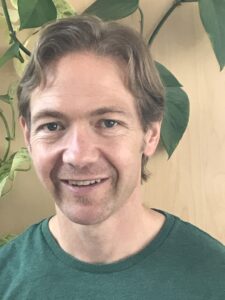 I first learned about place-based education while living in Missoula, Montana. My sense of belonging has been shaped by living, moving, reading, and writing in that landscape, and I’m excited to help create a sense of place here along the Willamette River. Cottonwood’s community-focused values truly inspire me.
I first learned about place-based education while living in Missoula, Montana. My sense of belonging has been shaped by living, moving, reading, and writing in that landscape, and I’m excited to help create a sense of place here along the Willamette River. Cottonwood’s community-focused values truly inspire me.
I have an extensive background in Montessori education. After studying History at the University of Montana, I earned my Montessori Early Childhood Education certification and later studied elementary education at Willamette University. Over the years, I’ve continued Montessori teaching and training (AMS Elementary, 6-9) and taught in public and private schools in Portland, Olympia, and northwest Montana.
Outside of teaching, I enjoy trail running, reading, and writing small poems.
Hello! My name is Randi Ring and I’m so excited to join the team here at The Cottonwood School! I was a teacher in Southern California before moving to Oregon, but I was actually born in Wisconsin. I love the Pacific Northwest for many reasons, one of which is that it reminds me of all the best parts of both of the states I’ve called home.
I studied geology at Humboldt State University and got a Master of Arts in Education at the University of California Santa Cruz. As a kid, I was obsessed with rocks and that passion followed me into adulthood. Now, I love sharing everything I can about earth science (and science in general!) with my students. In high school, I started lifeguarding and teaching swimming lessons during the summer, and that is where my passion for teaching began.
It brings me so much joy to help kids learn new skills and see their confidence grow. While I love the outdoors and nature, I also take solace in my quiet hobbies. Reading has been an integral part of my life since I was young and I love curling up with a cup of tea, a blanket, and a good story. I’ve found peace and relaxation through art as I develop my skills in drawing and painting. Wherever I can, I like to include art in my teaching!
Hello! I am Daniel McArthur, and I am excited to be the new MS Humanities teacher at CSCS. I’m a passionate educator with a love for history and writing. I’ve been lucky enough to work with students in a wide range of settings, from an all-girls Catholic school to a homeless youth resource center to public high schools in Detroit, Michigan. In my roles, I’ve seen my students do amazing things when compassionate teaching meets high-expectations. I am originally from Salt Lake City, Utah, where I developed a deep love for mountains and lakes. Outside of the classroom, I enjoy reading, running, and hanging out with my cats. I am always looking for a new book or park recommendation. Let me know if you have any suggestions!
Kaileah Hawk-Lowenstein (K-1) Originally from New Mexico, Kaileah considers Oregon to be her second home. In pursuit of teaching and the Pacific Northwest, she received her BA in Education from Pacific University with a concentration in Music and Music Education. For the last two years, Kaileah co-taught 2nd/3rd grade as a Resident Teacher at Arbor School of Arts and Sciences, concurrently completing a Masters of Arts in Teaching from Pacific University in Elementary Education. She is passionate about integrating arts into the curriculum and providing meaningful contexts to students’ learning. In addition, Kaileah is excited to teach in the place-based model at Cottonwood using the multiple perspectives that define this region. Outside of school, Kaileah loves to explore the Portland area through music, art, and nature. You can usually find her listening to music, singing, and playing sudoku.
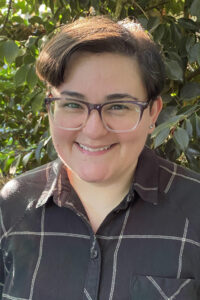 Laine is a 4/5 teacher, and no stranger to CSCS! Laine first worked with our students in grades K-8 as a math intervention teacher. They completed their student teaching in both 3rd and 5th grades at Chapman Elementary. They also completed two years of public service as a math teacher through AmeriCorps doing interventions with 7th and 9th grade students. Prior to their teaching career, Laine spent 10 years as a fundraising professional supporting cultural preservation for Alaska Native tribes. With the desire to be “on the ground” in direct service and with a passion for culturally responsive education, Laine pursued a Master’s in Education from PSU. At PSU, Laine was part of the arts integration cohort, where they developed lessons that included arts standards in core curriculum. Laine has a Bachelor’s in Music from University of Alaska and has personally experienced the empowering nature of including the arts in primary education. With their interest in social justice and creative expression, they are committed to helping students explore and discover how they can use what is uniquely special about themselves to make meaningful contributions to their community.
Laine is a 4/5 teacher, and no stranger to CSCS! Laine first worked with our students in grades K-8 as a math intervention teacher. They completed their student teaching in both 3rd and 5th grades at Chapman Elementary. They also completed two years of public service as a math teacher through AmeriCorps doing interventions with 7th and 9th grade students. Prior to their teaching career, Laine spent 10 years as a fundraising professional supporting cultural preservation for Alaska Native tribes. With the desire to be “on the ground” in direct service and with a passion for culturally responsive education, Laine pursued a Master’s in Education from PSU. At PSU, Laine was part of the arts integration cohort, where they developed lessons that included arts standards in core curriculum. Laine has a Bachelor’s in Music from University of Alaska and has personally experienced the empowering nature of including the arts in primary education. With their interest in social justice and creative expression, they are committed to helping students explore and discover how they can use what is uniquely special about themselves to make meaningful contributions to their community.

Aviva (Shannon) McClure is a dedicated and experienced artist and educator, recognized for her contributions to experiential curriculum development, racial equity, and community building in educational settings. With a dynamic career spanning over two decades, Aviva has held numerous roles that underscore her commitment to fostering inclusive and engaging learning environments.
Aviva holds a Master of Science in Educational Leadership and Policy from Portland State University (2012-2014) and a Bachelor of Science in Art Education K-12 from Bowling Green State University (1998-2002). She holds both an Oregon Administrator & Teaching License with a focus in the Arts. She has played a pivotal role in charter school foundation and leadership in Oregon, restorative justice leadership in Portland Public Schools, neighborhood safety plans in North Portland and school sites. Her early career includes roles as K-8 class teacher, lead art teacher, and vice principal in Portland Public Schools.
Aviva is a single mom of a rad OSU senior, founder of Our Turn PDX, former director of The Cascade Festival of African Films, and co-chair of Tisch PDX. In her time away from Cottonwood, Aviva climbs mountains, watches films, makes art, and plays with her Dog named Dave on the beach.
Email: avivamcclure [at] thecottonwoodschool.org
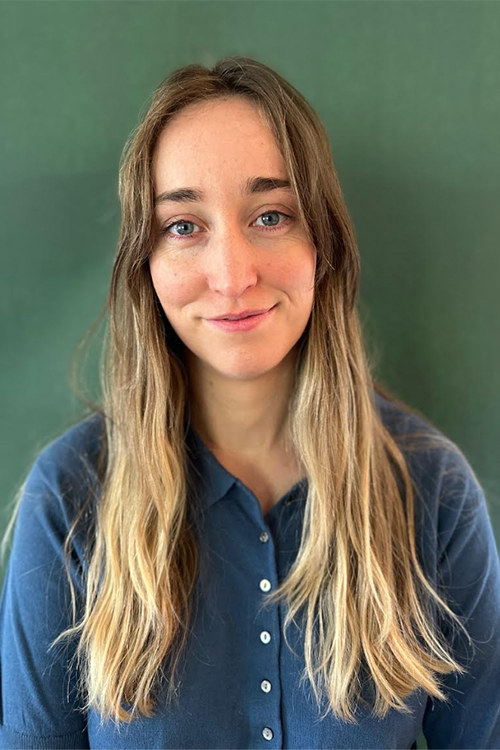
I have always been drawn to creativity and design and I am so excited to be the Art Teacher at Cottonwood. My background and training is in drawing, painting, printing-making, fiber arts, multimedia, and digital arts. I like to guide students with foundational questions that gradually lead to more complex themes and skills, instilling confidence in the face of challenges and autonomy in creative processes.
Before coming to CSCS, I taught K-3 Science at Arbor School and worked as the Equity and Inclusive Advocate at NWRESD’s Outdoor School. I received my BFA in fashion design at WashU in St. Louis and earned my masters in teaching at Lewis & Clark College. When not at school, I love collecting beads, shells, and fabrics; exploring new places on my bike; and eating strawberries.
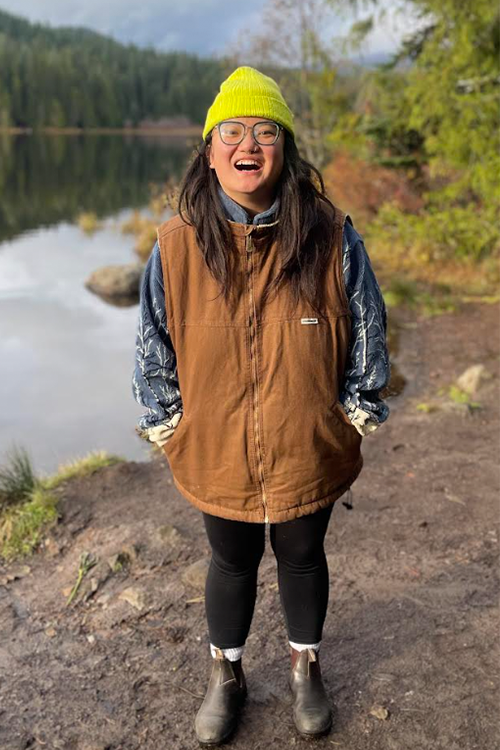
Anni grew up in Portland, but was born in Beijing, China. Her approach to teaching is experiential and relational. She became interested in working in the classroom at a young age as her mom was a K-2nd grade teacher. Anni is passionate about creating safe and inclusive spaces for learning. When she isn’t in the classroom, you can find her outside exploring, playing music, cooking, or biking and hiking with friends and family.
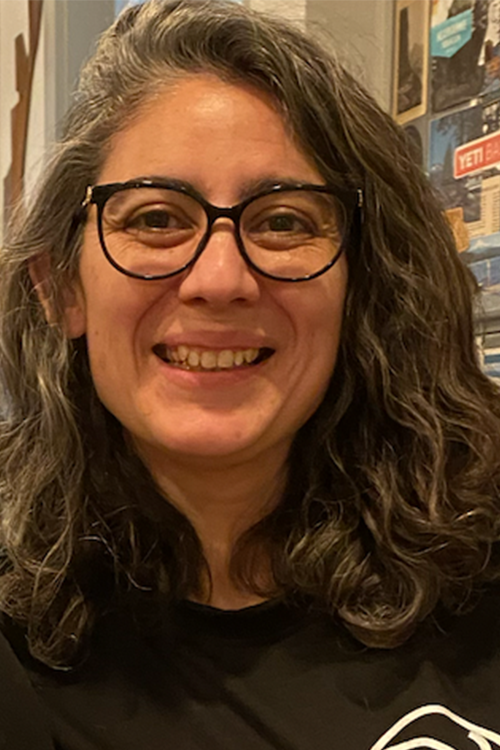
I have been teaching for 5 years at Chapman Elementary School in the Portland Public School district. I was a 5th grade teacher for 3 years and I have been a 3rd grade teacher for the last 2 years. Cottonwood’s mission and values align with my own as I create community-based classrooms with a diverse lens. I am excited to be a part of your community!
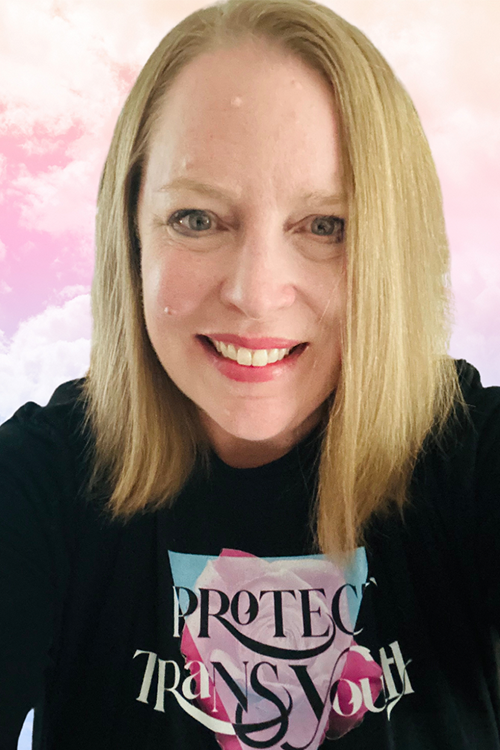 For over 25 years Laura has been serving youth and their families as a transformational leader, curriculum writer, trainer, educator, and advocate. She brings diverse experience working across sectors in schools, non-profits, athletics, mental health, and community based organizations. Lovingly committed to a growth mindset and educating the whole child she is excited to join a team of creative teachers, committed families, and inspiring students.
For over 25 years Laura has been serving youth and their families as a transformational leader, curriculum writer, trainer, educator, and advocate. She brings diverse experience working across sectors in schools, non-profits, athletics, mental health, and community based organizations. Lovingly committed to a growth mindset and educating the whole child she is excited to join a team of creative teachers, committed families, and inspiring students.
Laura has a passion for providing brave learning spaces for youth and adults while creating healing centered, culturally relevant, and accessible content for a wide variety of intersectional communities. She is a champion of our most vulnerable working to uplift and empower others by focusing on strengths. Laura recently moved from Oakland, CA to Portland with her partner of 21 years and amazing cat family. In her free time she has been exploring waterfalls, attending live events, swimming, coaching volleyball, and cooking up new recipes in the kitchen. She is most drawn to working at The Cottonwood School because of the supportive community, unique curriculum, commitment to DEI work, and the deep care for students and their sense of belonging.
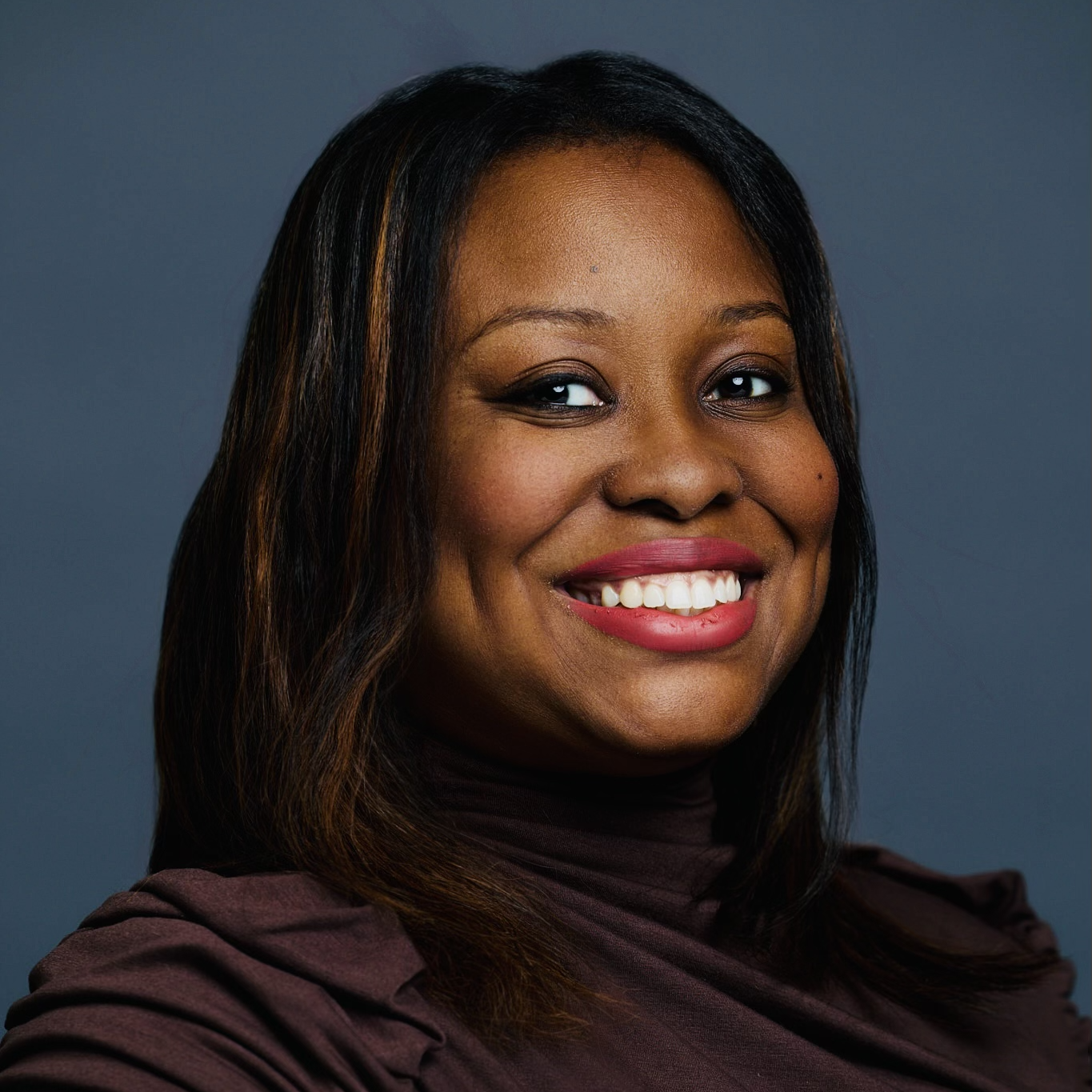
Alicia Moody is a passionate, thoughtful and value driven HR leader with experience providing strategy and HR consultation to business leaders supporting initiatives that impact and enhance organizational culture and business results. She has efficaciously supported leaders with specific focuses on recruitment, employee relations, talent development, operations, organizational design and program management while serving on leadership teams for over 13 years.
In her current role as an HR Director, she now supports a leading Medical Device company and leads the HR function. She previously functioned as a Global HR Director for Commercial Process & Operations and Legal, Sr. HR Manager primarily partnering with Global Field Service Engineering, HR Manager in drug product manufacturing supporting Quality, Engineering, Finance and EHS after completing an HR Leadership Development Program. Prior to completing her HR Leadership Development Program, Alicia served in various positions specializing in Recruitment, Program Management, Operations, Talent development, Strategy consultation and Deployment for the federal government, real estate, and education industries both within the United States and in China. Alicia received her Bachelor of Arts degree in Political Science from Georgia State University, Master of Science in Human Resource Management from Troy University and holds an Executive Juris Doctor from Purdue University Global.
Alicia passionately serves in diversity, equity and inclusion, as a mediator in her local community, and on the steering committee of her current company Black Employee Network ERG.

Julia is a parent to two Cottonwood students and wanted to get involved with the school to build community and help continue the efforts of place-based education.
Professionally, Julia is a lawyer with over a decade of experience prosecuting financial crimes. She has also been lucky enough to travel and teach prosecutors and judges domestically and around the world about financial investigations, asset forfeiture, and illicit uses of cryptocurrency.
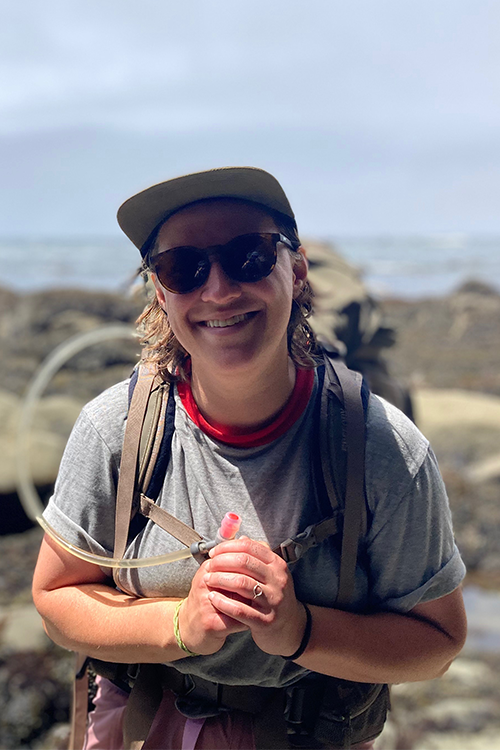
Gail grew up in the state of Vermont, and takes their love of nature, outdoor education, and environmentalism into their instruction and educational methods. They moved to Oregon in 2018 and worked as the Garden Coordinator at Sabin Elementary school before joining the Cottonwood team.
They have years of experience in outdoor and field education, and love being goofy in the woods both with and without students. They worked in the Bahamas as an environmental educator before moving to Oregon and would love to share their adventures if you catch them in the hallway or on the playground! They love the outdoors, backpacking, and playing soccer. Their love for education is deep and fostered by the fun that they bring into the classroom! They’re excited to join the Cottonwood team as the 8th grade Homeroom Teacher and the Middle School Field Work Coordinator!
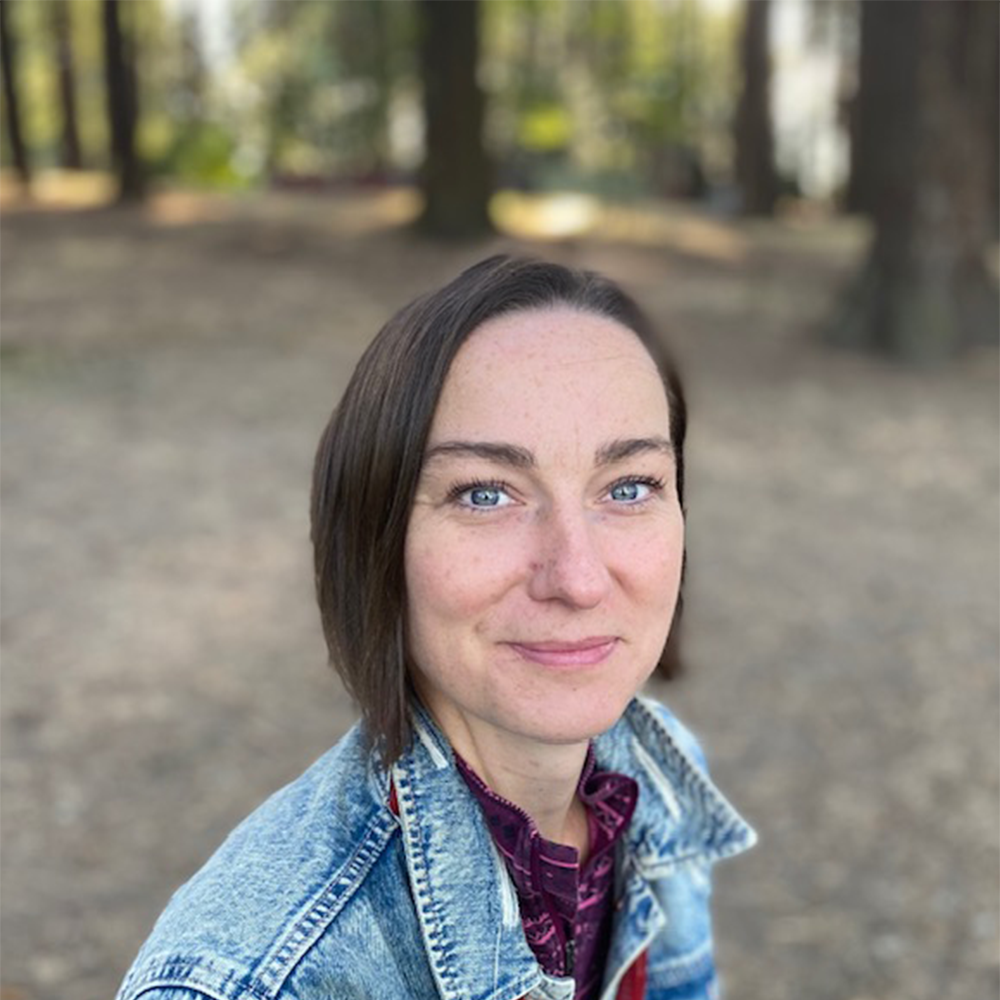
Jill is a parent at Cottonwood with her youngest son entering 2nd Grade. She currently works as a Lactation Consultant while homeschooling her eldest son and has served on several non profit boards both here and in the UK. Jill worked as a Mental Health and Addictions Nurse for 10 years, working in both the community and supporting students in Higher Education. She also has personal experience with neurodiversity and learning challenges in children.
Jill joined the board because she is passionate about the school’s values. She hopes to bring her experience in the field of mental health and neurodiversity to help steer the school towards their goals of supporting children to participate in authentic, hands-on learning experiences that are closely tied to the community.

Matthew Claudel is the founder of Field States, a benefit company based in Portland, Oregon that uses a unique design process to discover place-based potential and create new forms of value for people and the planet. He is a visiting assistant faculty member at University of Michigan’s Taubman School of Architecture and an affiliate faculty member of Portland State University’s Geography Department. Matthew was previously the Strategic Design lead for a national healthcare company called Curative.
In 2016, Matthew co-founded MIT’s designX program, where he was the Head of Civic Innovation and an instructor for four years. Matthew has co-authored two books, Open Source Architecture (Thames & Hudson) and The City of Tomorrow (Yale University Press), and published articles in peer reviewed journals, book chapters and speculative fiction pieces, primarily surrounding the issues of technology, design, and cities.
Matthew served on the jury for the Canadian Federal government’s $50M Smart City Challenge, and supports the continuation of the program as a strategic advisor for the Community Solutions Network, through Open North. Matthew was a Futures Fellow at the Purpose Foundation in 2021 and a Public Policy Fellow at the Boston Mayor’s Office of New Urban Mechanics in 2018. As an undergraduate, he studied architecture at Yale, and received a Master of Science in Urban Studies from MIT. Matthew has a doctorate in Advanced Urbanism from MIT, where his work focused on the emerging practices of urban experimentation as they relate to civic value.
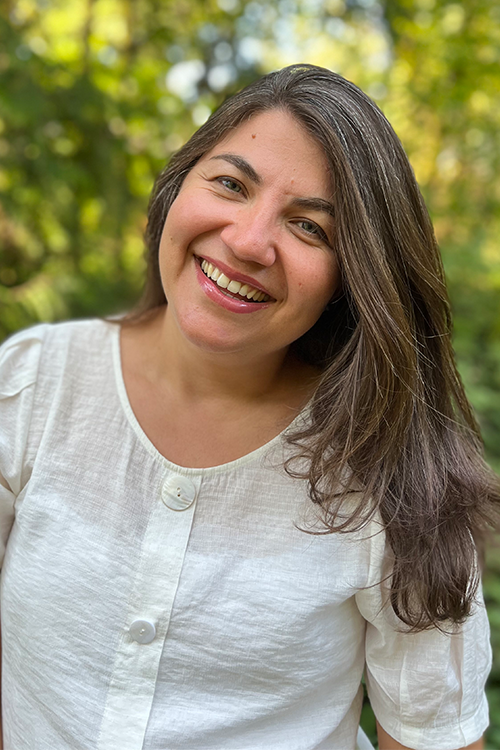 Kristin is Cottonwood’s School Counselor where she supports student social emotional learning, academic engagement and access, and mental health and well-being at school. She is invested in integrating social emotional learning and wellness across our curriculum at Cottonwood. By teaching students to connect with themselves, each other, the wider community and the earth, we can build a more equitable world.
Kristin is Cottonwood’s School Counselor where she supports student social emotional learning, academic engagement and access, and mental health and well-being at school. She is invested in integrating social emotional learning and wellness across our curriculum at Cottonwood. By teaching students to connect with themselves, each other, the wider community and the earth, we can build a more equitable world.
Kristin has worked with students for over 20 years ranging from preschool through 12th grade. She is passionate about co-creating a community where everyone can shine, learn, grow, and find balance. She loves people, communication, learning, and unlearning. When she is not at school, Kristin enjoys cooking, walking through trees, swimming in the river, learning about plants, and spending time with her family and appreciating simple things.
 Amanda joined the faculty at Southwest Charter in Fall 2010 as the kindergarten teacher, during the 2014/15 school year she began her transition into administration, becoming the Executive Director in 2016. After being away for 22 years, Amanda returned to her hometown of Portland in 2008 to raise her two boys. Amanda received her Master’s Degree in Education from the Claremont Graduate School, Claremont, California in 1992. With her degree in hand, she has taught in a number of small alternative schools, designed a successful children’s clothing line using recycled materials, and started her own Place-based school in rural Montana. Amanda believes strongly in the power of Place-Based Education and getting children out from behind their desks and into active, hands-on learning! She loves children and is enthusiastic about the outdoors, her community, family, cooking, and crafts.
Amanda joined the faculty at Southwest Charter in Fall 2010 as the kindergarten teacher, during the 2014/15 school year she began her transition into administration, becoming the Executive Director in 2016. After being away for 22 years, Amanda returned to her hometown of Portland in 2008 to raise her two boys. Amanda received her Master’s Degree in Education from the Claremont Graduate School, Claremont, California in 1992. With her degree in hand, she has taught in a number of small alternative schools, designed a successful children’s clothing line using recycled materials, and started her own Place-based school in rural Montana. Amanda believes strongly in the power of Place-Based Education and getting children out from behind their desks and into active, hands-on learning! She loves children and is enthusiastic about the outdoors, her community, family, cooking, and crafts.
Email: amandamcadoo [at] thecottonwoodschool.org
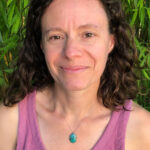 Sarah K. Anderson, was previously our 7th/8th teacher specializing in language arts and social studies, was originally lured to Oregon by its waterfalls. She spent most of her childhood exploring rivers and forests near her rural Vermont home- experiences which provided inspiration for a passion for nature and all things wild. After graduating with a degree in American Studies from Bard College in New York, Sarah served as an AmeriCorps volunteer for Metro Parks and Greenspaces in Portland. Since then, she has worked as a crew leader at an educational farm in Vermont, a Teacher Naturalist in the California Redwoods and a Middle School Humanities teacher at The
Sarah K. Anderson, was previously our 7th/8th teacher specializing in language arts and social studies, was originally lured to Oregon by its waterfalls. She spent most of her childhood exploring rivers and forests near her rural Vermont home- experiences which provided inspiration for a passion for nature and all things wild. After graduating with a degree in American Studies from Bard College in New York, Sarah served as an AmeriCorps volunteer for Metro Parks and Greenspaces in Portland. Since then, she has worked as a crew leader at an educational farm in Vermont, a Teacher Naturalist in the California Redwoods and a Middle School Humanities teacher at The 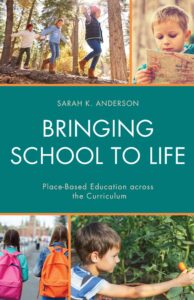 Key School in Annapolis, Maryland. Sarah received a Masters of Education from Antioch New England Graduate School, where she specialized in integrated and place-based education. In addition to exploring the local neighborhoods and environs with her zany middle-schoolers, Sarah enjoys knitting, hiking, pickling, reading good books, and climbing waterfalls.
Key School in Annapolis, Maryland. Sarah received a Masters of Education from Antioch New England Graduate School, where she specialized in integrated and place-based education. In addition to exploring the local neighborhoods and environs with her zany middle-schoolers, Sarah enjoys knitting, hiking, pickling, reading good books, and climbing waterfalls.
Sarah has written a book about Place-Based Learning and The Cottonwood School of Civics and Science, titled “Bringing School to Life: Place-based Education Across the Curriculum.” Learn more about the book here .
Email: sarahanderson [at] thecottonwoodschool.org
 Susan joined the teaching staff of the Cottonwood School in 2012. She has over 15 years of teaching experience spanning grades two through six in both public and private schools. In 2018 she joined the administrative team as Academic Director and is enjoying supporting staff and students in this new role. Susan received her Masters of Education from the University of Pennsylvania and found her way to Oregon as the result of marrying a native Oregonian. She spent most of her childhood living outside the United States. She was born in Brazil, completed high school in Belgium and as an adult has also lived in Russia. These international experiences have helped her develop a strong appreciation for other cultures and viewpoints. When not at school, she enjoys travelling to new places whenever she can. She is an avid reader and helps to promote this with students through participation in Battle of the Books.
Susan joined the teaching staff of the Cottonwood School in 2012. She has over 15 years of teaching experience spanning grades two through six in both public and private schools. In 2018 she joined the administrative team as Academic Director and is enjoying supporting staff and students in this new role. Susan received her Masters of Education from the University of Pennsylvania and found her way to Oregon as the result of marrying a native Oregonian. She spent most of her childhood living outside the United States. She was born in Brazil, completed high school in Belgium and as an adult has also lived in Russia. These international experiences have helped her develop a strong appreciation for other cultures and viewpoints. When not at school, she enjoys travelling to new places whenever she can. She is an avid reader and helps to promote this with students through participation in Battle of the Books.
Email: susanhathaway [at] thecottonwoodschool.org
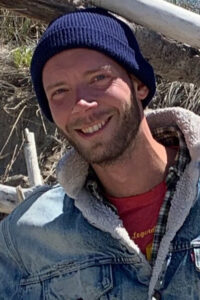 McLean came to Cottonwood in the fall of 2019 as a teacher candidate in Morgen’s 4/5 classroom, before moving to the middle school. He recently earned his Masters in Education from Portland State and works to incorporate music, theater, and storytelling in the classroom each day. Prior to his time at CSCS, McLean served as a classroom assistant and after school teacher at The Ivy School, a summer camp instructor/Earth Mage at Trackers Earth, after school care bus driver, field educator at an environmental non-profit, and Expressive Arts Program Coordinator. Originally from Juneau, Alaska, McLean enjoys backpacking, playing the guitar, looking at maps, creating art, sports, video editing, playing board games, long road trips, and crossword puzzles with his morning coffee.
McLean came to Cottonwood in the fall of 2019 as a teacher candidate in Morgen’s 4/5 classroom, before moving to the middle school. He recently earned his Masters in Education from Portland State and works to incorporate music, theater, and storytelling in the classroom each day. Prior to his time at CSCS, McLean served as a classroom assistant and after school teacher at The Ivy School, a summer camp instructor/Earth Mage at Trackers Earth, after school care bus driver, field educator at an environmental non-profit, and Expressive Arts Program Coordinator. Originally from Juneau, Alaska, McLean enjoys backpacking, playing the guitar, looking at maps, creating art, sports, video editing, playing board games, long road trips, and crossword puzzles with his morning coffee.
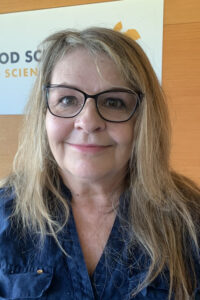 Nancy joined the Cottonwood Special Education team as a half-time learning resource teacher in the Fall of 2020. Over the years, she has evolved as an individual that sees great value in education. In her generation, there were no additional supports for students to develop their areas of weakness. She was a high school drop-out that yearned to be equal. Throughout her life, she strived daily with small challenges that propelled her forward.
Nancy joined the Cottonwood Special Education team as a half-time learning resource teacher in the Fall of 2020. Over the years, she has evolved as an individual that sees great value in education. In her generation, there were no additional supports for students to develop their areas of weakness. She was a high school drop-out that yearned to be equal. Throughout her life, she strived daily with small challenges that propelled her forward.
Nancy graduated from the Cinema, Television, Stage, and Radio Arts program at Southern Alberta Institute of Technology with a Practical Arts Degree, as a writer/producer for television.
She also studied the fine art of printmaking at Northern Virginia Community College and became a professional printmaker.
She pursued interdisciplinary studies in education, art, and psychology at George Mason University. Her Masters in Education is from Regent University; with an Adaptive Endorsement from George Mason University.
She is also a proud mom of two, who both had learning challenges throughout grade school, one of whom is now a veterinarian.
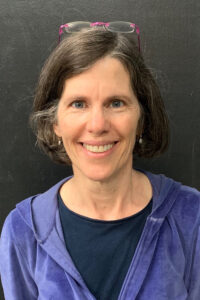 Liza joined the Cottonwood staff in 2018 as the full-time special education teacher. She holds a bachelor’s degree in History from Trinity College in Hartford, Connecticut and a dual Master’s degree in Reading & Special Education from the University of Michigan. Liza grew up in a large family in the Northeast that included a special needs sibling. Before getting her masters, she worked in administrative positions at schools in Boston and Southeastern Michigan. After grad school, she and her husband relocated to the Northwest for access to all of the outdoor activities in the Cascades and Oregon coast. In Portland, she has taught special education at Beaverton High School, Peninsula Elementary and Portland Village School. She is thrilled to be at Cottonwood where she appreciates the close knit community of staff & students along with the school’s place based education mission. In her free time, Liza enjoys spending time with her family in the mountains or at the coast, buzzing around in her EV, and enjoying the many great coffee houses in the Northwest.
Liza joined the Cottonwood staff in 2018 as the full-time special education teacher. She holds a bachelor’s degree in History from Trinity College in Hartford, Connecticut and a dual Master’s degree in Reading & Special Education from the University of Michigan. Liza grew up in a large family in the Northeast that included a special needs sibling. Before getting her masters, she worked in administrative positions at schools in Boston and Southeastern Michigan. After grad school, she and her husband relocated to the Northwest for access to all of the outdoor activities in the Cascades and Oregon coast. In Portland, she has taught special education at Beaverton High School, Peninsula Elementary and Portland Village School. She is thrilled to be at Cottonwood where she appreciates the close knit community of staff & students along with the school’s place based education mission. In her free time, Liza enjoys spending time with her family in the mountains or at the coast, buzzing around in her EV, and enjoying the many great coffee houses in the Northwest.
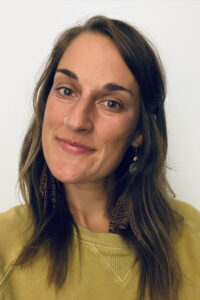 Sara joined the CSCS in the fall of 2021 after working as a substitute in PPS and then teaching a small cohort of 1st graders during the 2020/2021 pandemic year. Sara has always felt connected to being an educator. After completing her undergraduate degree in Environmental Studies, she worked as an educator for the Portland Audubon, and as a wilderness instructor for a nonprofit in Montana. Feeling eager to bring the outdoors into a classroom, Sara then decided to pursue a Masters in Education at PSU. She loves the challenge and artistry that comes with a teaching career and especially enjoys fostering wonder and compassion in children. When she isn’t teaching, Sara enjoys gardening, paddleboarding, hiking and backpacking, seeing live music, creating art with friends, traveling to tropical places, foraging for mushrooms, and diving into a good book.
Sara joined the CSCS in the fall of 2021 after working as a substitute in PPS and then teaching a small cohort of 1st graders during the 2020/2021 pandemic year. Sara has always felt connected to being an educator. After completing her undergraduate degree in Environmental Studies, she worked as an educator for the Portland Audubon, and as a wilderness instructor for a nonprofit in Montana. Feeling eager to bring the outdoors into a classroom, Sara then decided to pursue a Masters in Education at PSU. She loves the challenge and artistry that comes with a teaching career and especially enjoys fostering wonder and compassion in children. When she isn’t teaching, Sara enjoys gardening, paddleboarding, hiking and backpacking, seeing live music, creating art with friends, traveling to tropical places, foraging for mushrooms, and diving into a good book.
 Before coming to CSCS, Dan spent most of his career teaching and writing curriculum for outdoor and environmental education programs. In that time he saw the way experiential education inspired a love for learning and became passionate about finding ways to incorporate those lessons into the classroom. He received a Masters of Teaching from Oregon State University, worked as an educational aide in the supported life skills classroom at Centennial High School, and taught in a 5th grade classroom in the Beaverton School District. When he’s not teaching, Dan loves woodworking, spending time in the wilderness with his partner and two step-sons, and travelling by motorcycle.
Before coming to CSCS, Dan spent most of his career teaching and writing curriculum for outdoor and environmental education programs. In that time he saw the way experiential education inspired a love for learning and became passionate about finding ways to incorporate those lessons into the classroom. He received a Masters of Teaching from Oregon State University, worked as an educational aide in the supported life skills classroom at Centennial High School, and taught in a 5th grade classroom in the Beaverton School District. When he’s not teaching, Dan loves woodworking, spending time in the wilderness with his partner and two step-sons, and travelling by motorcycle.
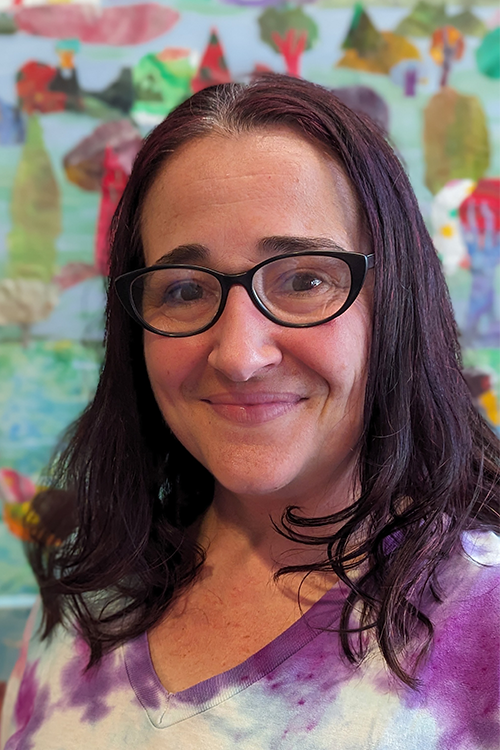 Katt will be supporting our K-3 students in the area of literacy. She has been an educator since 2001, making this her 20th year of teaching. Much of that teaching was done in classrooms, mental health facilities, and students struggling with math and reading. She has recently graduated with her MSE in Curriculum and Education, and has a Professional Teaching Certificate, along with her Reading endorsement.
Katt will be supporting our K-3 students in the area of literacy. She has been an educator since 2001, making this her 20th year of teaching. Much of that teaching was done in classrooms, mental health facilities, and students struggling with math and reading. She has recently graduated with her MSE in Curriculum and Education, and has a Professional Teaching Certificate, along with her Reading endorsement.
Katt has also been part of the CSCS community since her first child was in Kindergarten, almost 8 years ago, and also has a student currently at the school. She is thrilled to be a part of this staff and looks forward to working with our youngest readers.
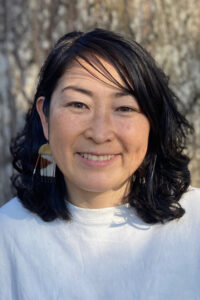 Born in Japan, Yuri originally came to the US to study recreation and PLAY to follow her passion. She has a background in organizing experience-based recreational, educational, and cross-cultural programs and place-making projects both in the US and Japan. In Japan, Yuri spearheaded the creation of a community nature school, where multi-generational community members can gather and share their traditions, knowledge, and stories in and near the sacred forest. Yuri is a trained playworker and a board member for the nonprofit organization, Portland Free Play, which provides creative play opportunities for underserved communities and public school recess programs with recycled scrap materials. At the Cottonwood Adventure Play, children are provided a safe environment with open-ended “loose parts” that empower them to create, collaborate, explore and thrive through this unique program. Yuri has been a school parent for the last 6 years in the Cottonwood community. Outside of school, she enjoys cooking, gardening, designing, and being in nature.
Born in Japan, Yuri originally came to the US to study recreation and PLAY to follow her passion. She has a background in organizing experience-based recreational, educational, and cross-cultural programs and place-making projects both in the US and Japan. In Japan, Yuri spearheaded the creation of a community nature school, where multi-generational community members can gather and share their traditions, knowledge, and stories in and near the sacred forest. Yuri is a trained playworker and a board member for the nonprofit organization, Portland Free Play, which provides creative play opportunities for underserved communities and public school recess programs with recycled scrap materials. At the Cottonwood Adventure Play, children are provided a safe environment with open-ended “loose parts” that empower them to create, collaborate, explore and thrive through this unique program. Yuri has been a school parent for the last 6 years in the Cottonwood community. Outside of school, she enjoys cooking, gardening, designing, and being in nature.
 Hey Parents…my name is Spencer Rubin. I am a Beaverton resident…and one of you: A parent.. We began Play.Fit.Fun to provide kids…parents…families opportunities for: More Fun! More Play! More Activity! Plus…empowerment, confidence, respect, socialization, leadership, teamwork, interaction, after school care for kids with working parents…or for parents who simply want their kids to have 1-3 hours of Fun-Activity…in an organized curriculum and positive environment, while socializing with kids their age interpersonally. No Electronics Allowed!
Hey Parents…my name is Spencer Rubin. I am a Beaverton resident…and one of you: A parent.. We began Play.Fit.Fun to provide kids…parents…families opportunities for: More Fun! More Play! More Activity! Plus…empowerment, confidence, respect, socialization, leadership, teamwork, interaction, after school care for kids with working parents…or for parents who simply want their kids to have 1-3 hours of Fun-Activity…in an organized curriculum and positive environment, while socializing with kids their age interpersonally. No Electronics Allowed!
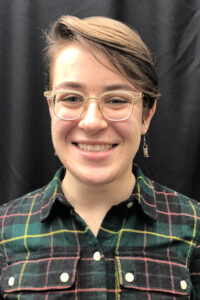 Cinzia (pronounced “Cheen-tzee-uh”) Ballantyne joined Cottonwood in the fall of 2021 as our math interventionist. She is currently our math interventionist and 7/8th grade math teacher. Cinzia hails from Boston, Massachusetts, but has lived in 6 states and 2 countries! She has a degree in biostatistics and biology from Simmons University in Boston. Her background is in insect and plant ecology, but has also been tutoring and teaching in learning centers between field research seasons since college. She loves to bring her experience using math outdoors and her statistics knowledge into the classroom! When she isn’t teaching, Cinzia enjoys cooking Italian food, hiking, photographing nature, watching documentaries, and spending time with her wife and her mom’s dogs.
Cinzia (pronounced “Cheen-tzee-uh”) Ballantyne joined Cottonwood in the fall of 2021 as our math interventionist. She is currently our math interventionist and 7/8th grade math teacher. Cinzia hails from Boston, Massachusetts, but has lived in 6 states and 2 countries! She has a degree in biostatistics and biology from Simmons University in Boston. Her background is in insect and plant ecology, but has also been tutoring and teaching in learning centers between field research seasons since college. She loves to bring her experience using math outdoors and her statistics knowledge into the classroom! When she isn’t teaching, Cinzia enjoys cooking Italian food, hiking, photographing nature, watching documentaries, and spending time with her wife and her mom’s dogs.
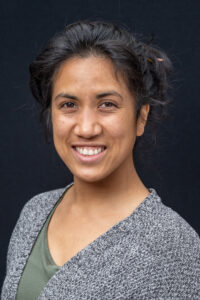 Gina joined CSCS in fall of 2019. She comes with experience of working as a community support specialist assisting adults with varying physical and mental abilities, and as a preschool teaching assistant that cared for children between 3 months and 6 years old prior to that. Growing up in New Jersey has exposed her to many different cultures and social classes which gives her the tender ability to see things from many different angles. As a person who has worn multiple hats since graduating Rutgers University with a Bachelor’s of Science in 2013, she understands that there are infinitely many ways of thinking and viewing the world. This understanding helps her guide those who may deviate from the standard towards discovering their strengths, so that they can develop the skills to eventually pursue their education independently. As a person who came to Portland with next to nothing and found a way to summit mountains, ride 200 miles to Seattle via bicycle, and build a stable and successful life, she knows that everyone around her is way more capable than they realize and it is her mission to show them that potential.
Gina joined CSCS in fall of 2019. She comes with experience of working as a community support specialist assisting adults with varying physical and mental abilities, and as a preschool teaching assistant that cared for children between 3 months and 6 years old prior to that. Growing up in New Jersey has exposed her to many different cultures and social classes which gives her the tender ability to see things from many different angles. As a person who has worn multiple hats since graduating Rutgers University with a Bachelor’s of Science in 2013, she understands that there are infinitely many ways of thinking and viewing the world. This understanding helps her guide those who may deviate from the standard towards discovering their strengths, so that they can develop the skills to eventually pursue their education independently. As a person who came to Portland with next to nothing and found a way to summit mountains, ride 200 miles to Seattle via bicycle, and build a stable and successful life, she knows that everyone around her is way more capable than they realize and it is her mission to show them that potential.
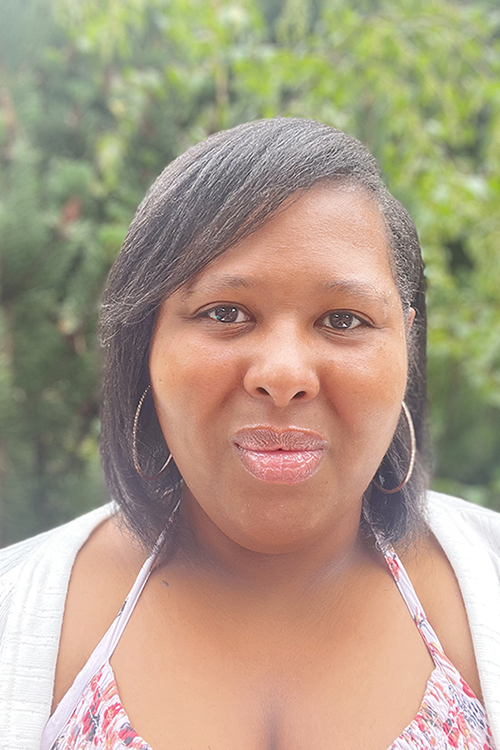
Sade joined the CSCS community in 2017 when her oldest was in kindergarten at Cottonwood; now she has three children attending. Cottonwood’s place-based curriculum and passion for civic engagement was the foundation for putting her kids at CSCS. Sade has joined the faculty this year after being a stay-at-home mom, and student all while serving on the board and the DEI committee the past two years. Sade recently graduated from Portland State University with a Bachelor’s in Communication. She also has an Associate Degree in Business Administration.
Sade believes every child from a diverse background should have someone advocating for them in the school system. Growing up, Sade lived all over Portland and Vancouver, and as a person of color, she understands first-hand how challenging a school system embedded in systemic racism can be. The experience of being unnoticed and forgotten by an education system rooted in systemic racism inspired her passion for DEI work. The passion she has for DEI comes from her own lived experiences and raising four black children in the public-school system. Her philosophy is that all schools should foster a culture of difference, hold individuals accountable for equity, and challenge preexisting notions and misconceptions. This work in making CSCS a more inclusive environment is something she believes the school is committed to doing. In her free time Sade enjoys writing poetry, listening to music, dancing, and spending time with her family.
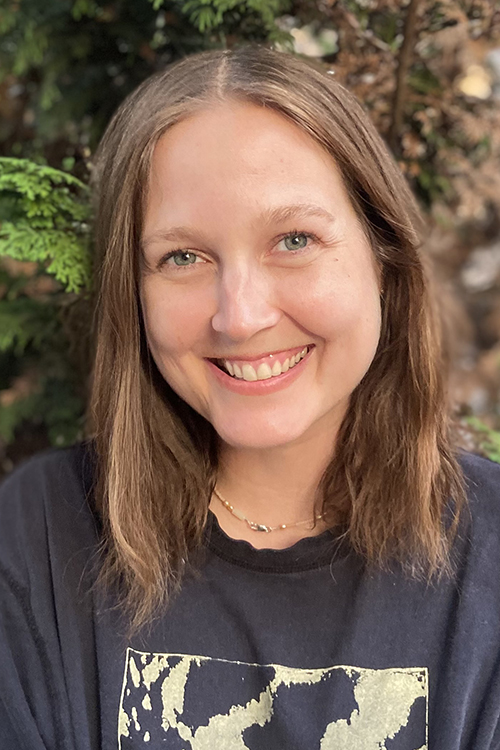
Elizabeth is the new 4/5 teacher at CSCS in 2022. Before coming to CSCS, Elizabeth taught for years at a Reggio-inspired preschool. Her work leading this inquiry-based program was foundational in the development of her teaching philosophy, which centers children’s innate need for engaging learning environments that make meaningful connections to the greater world.
Elizabeth grew up in rural Oregon, earning her undergraduate degree in psychology at Reed College and her Masters in Education from Portland State University. When she is not working or volunteering with children, Elizabeth loves playing the guitar, hiking and biking around, and cooking for family and friends.
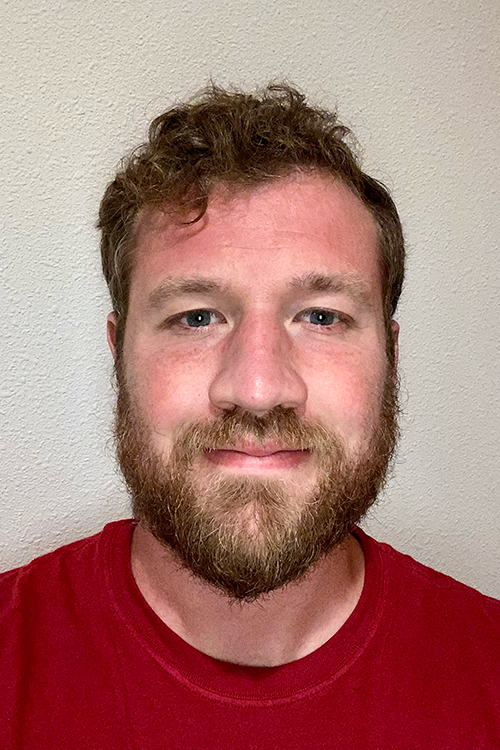
Daniel is a soccer fanatic, having grown up in England and his weekends generally consist of waking up early to watch the English Premier League before heading out to play in or coach a game or two. He studied Sports Development at University and has a vast background in sports coaching, exercise and the leisure industry in general.
Daniel first stepped foot in Portland in 2014-15 as a traveling soccer coach, coaching soccer camps throughout the country. He then did an 18 month working holiday in New Zealand and Australia before he made a permanent move to Portland in 2018. Since that date as a licensed coach in both the UK and US, he worked for 2 Soccer Organizations in the city before beginning his PE Teacher role at CSCS in 2022. He is passionate to give the children a positive experience in physical activity that will resonate with them for the rest of their lives. He is known by his friends as an explorer with interests such as hiking, camping, cycling, sports, visiting National Parks and paddling on one of the many lakes or rivers in Oregon.
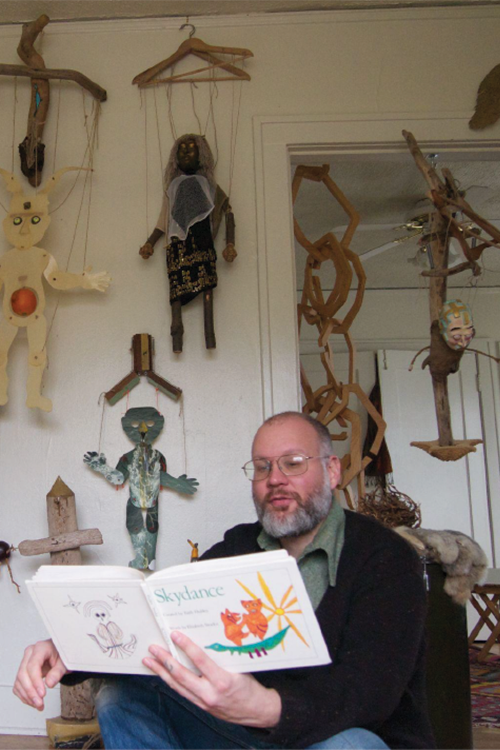
Joe is a lifelong self directed learner, an artist, a nature lover and parent to a vibrant eleven year old child, Loraine. He believes passionately in the power of playful, experiential (doing “real stuff”), feminist, learner led education. Joe began building puppets from discarded and natural materials as a six year old child in Memphis, Tennessee. Since then he has developed a personal, creative practice in which he uses music, puppetry and theater to share social and emotional ‘strategies’ and to discover, together with children, new ways to critically interrogate and dis-organize from systems of oppression. Joe loves to ride his bike and to collect rocks with his daughter.
Joe has more than 20 years of professional experience teaching children in preschool and school age classrooms and as a community organizer. He currently serves on the board of two youth focused nonprofits: Portland Free Play and Poetic Justice Foundation. He is a founding member of the PDX Childcare Collective and until recently, he operated a radical preschool out of his home called Air/Plane Cottage School. Joe built an adventure playground in his backyard from recycled materials. This is an evolving, interactive collaboration between children and adults as well as a playful exercise in hopeful worldbuilding!
When not working with kids Joe plays music with his band(s), hosts events with his collective house of queer artists, volunteers with racial justice and houseless advocacy groups and avidly reads poetry, history and political theory.
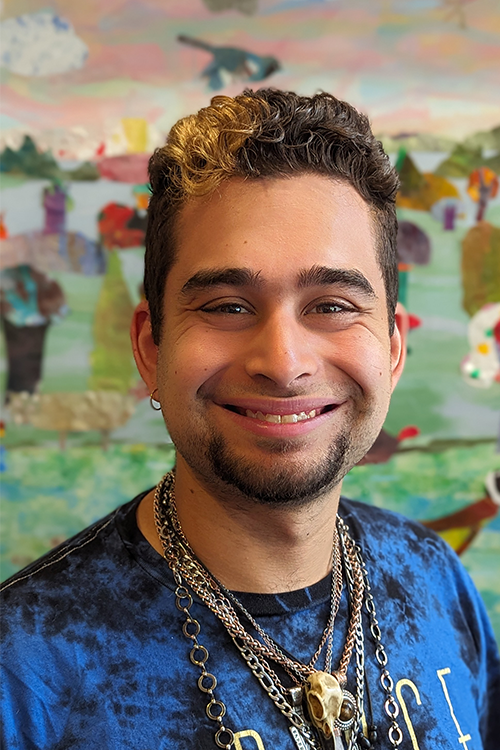
Stevie started their Cottonwood journey back in 2009 as a student in middle school. After receiving their Eagle Scout award and graduating high school, they eventually continued their journey by earning a B.S. in Anthropology and minor in History from Portland State University.
2023-24 is Stevie’s first year with the Cottonwood School of Civics and Science as an assistant teacher and their end goal is to gain the opportunity to step up and teach history to the next generation of students.
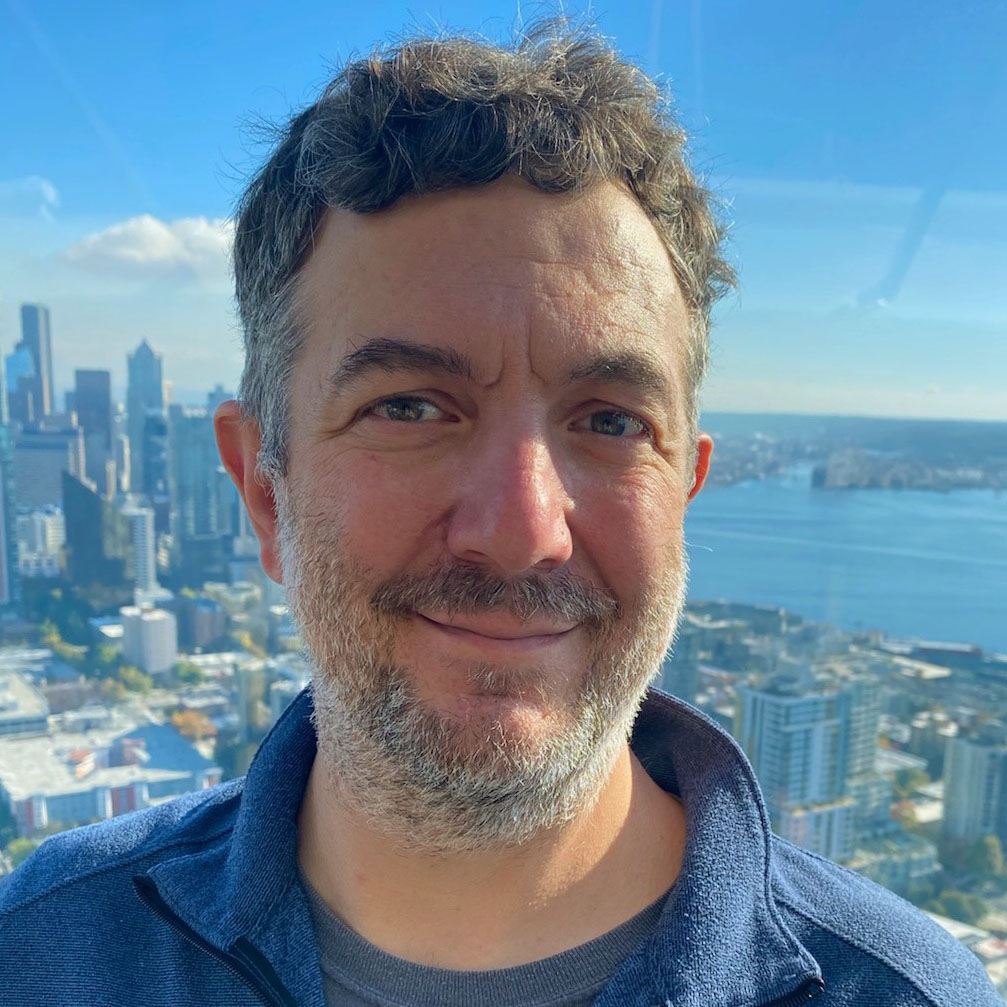
Kyle (he/him) is a parent of two Cottonwood students and brings passion for finding ways to build space for neurodiversity into the fabric of welcoming communities. He has experience serving as an officer and director of local and state level nonprofits in Oregon and New York. He has worked in healthcare revenue management and in social services, in small business consulting, and is currently starting a small local aviation business.
Kyle is excited to build relationships here, work toward more diversity and inclusion in our community, watch Cottonwood continue to grow, watch his children thrive, and see what new things come.

Jonathan Moore (he/him) is the father of two students at Cottonwood and is the CTO of SpiderOak.
Jonathan joined the board to support the school community bringing his experience in listening to needs and working as a group to meet goals. This experience comes both from his crear as well as his work in arts and community organizations.
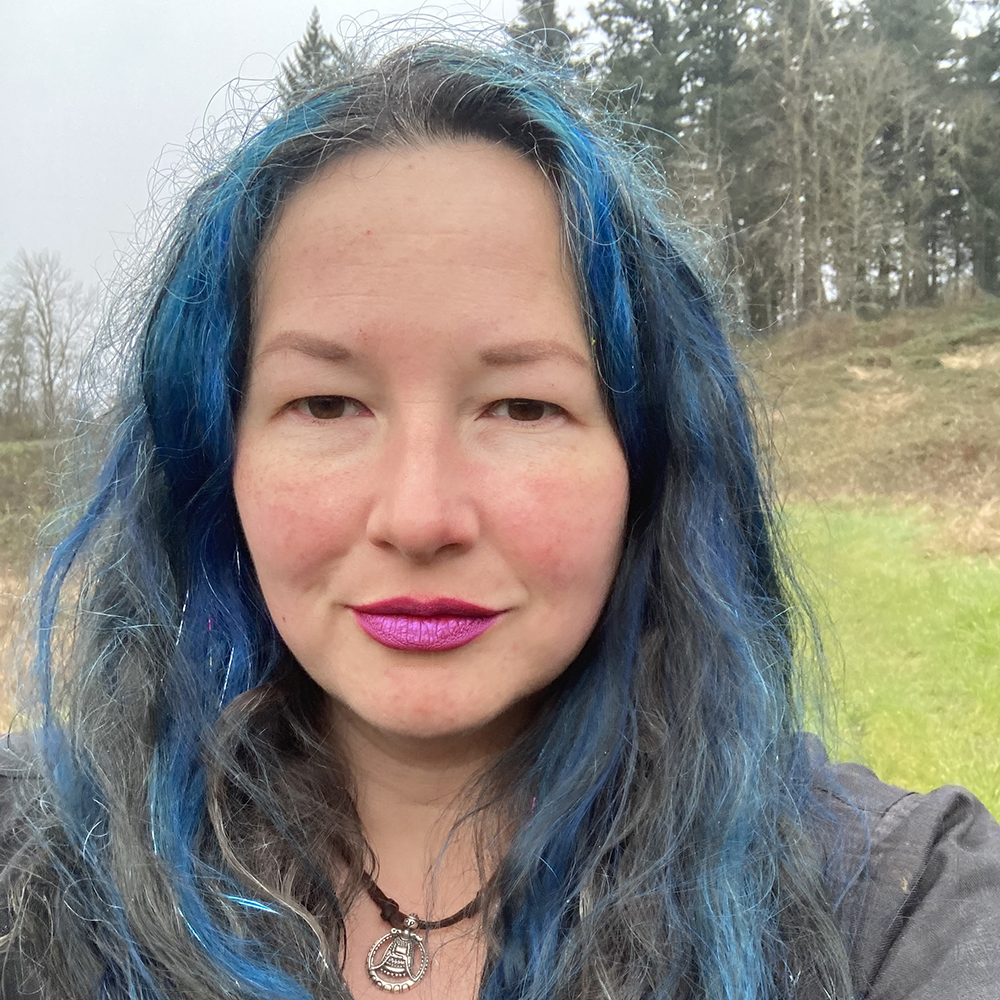
Karissa was born and raised in Longview, Washington and she now lives in southeast Portland with her husband, Ian, their three year old son, Ragnar, and their two big dogs, Lulu and Yogi.
Karissa and Ragnar are enrolled in the Cowlitz Indian Tribe. She served for 15 years as an elected member of the Cowlitz Tribal Council and has served on many different Tribal boards and committees. In recent years she’s transitioned her volunteer work to organizations in the broader community, and she was excited for the opportunity to serve the Cottonwood School and learn more about this wonderful school community.
Karissa’s professional background has focused on Tribal governments and services and on philanthropy. She currently works for Oregon Metro as the program manager of the Nature in Neighborhoods community grants program.
 Lisa joined the teaching team at CSCS in 2007. Prior to teaching at SWCS, she worked with the Oregon Museum of Science and Industry (OMSI) where for four years she developed science curriculum and taught students of all ages around the state. Her love of science and exploration began back in Michigan where she and her sister would explore their neighborhood, looking for insects and tinkering in their father’s work shed. That interest would take her to study at the University of Michigan where she discovered she had a talent for teaching and received a Bachelor of Arts in Education with High Distinction. She recently completed her Master’s degree at Concordia. She has taught in a variety of educational settings from large group assemblies, which encouraged a love of theater, to small group classrooms, where she can give individualized attention. Her strong science background is accented by a passion for storytelling, folklore & mythology from around the world. Inspired by those tales, she creates visual art, plays with the Stumptown-Jugthumpers as a washboard player, and is learning how to make puppets. Lisa brings her enthusiasm and talents to share and loves discovering and honing the talents and skills of each of her students.
Lisa joined the teaching team at CSCS in 2007. Prior to teaching at SWCS, she worked with the Oregon Museum of Science and Industry (OMSI) where for four years she developed science curriculum and taught students of all ages around the state. Her love of science and exploration began back in Michigan where she and her sister would explore their neighborhood, looking for insects and tinkering in their father’s work shed. That interest would take her to study at the University of Michigan where she discovered she had a talent for teaching and received a Bachelor of Arts in Education with High Distinction. She recently completed her Master’s degree at Concordia. She has taught in a variety of educational settings from large group assemblies, which encouraged a love of theater, to small group classrooms, where she can give individualized attention. Her strong science background is accented by a passion for storytelling, folklore & mythology from around the world. Inspired by those tales, she creates visual art, plays with the Stumptown-Jugthumpers as a washboard player, and is learning how to make puppets. Lisa brings her enthusiasm and talents to share and loves discovering and honing the talents and skills of each of her students.
 Kathy Price, a former preschool teacher, has been working with CSCS since the opening in 2007 (as Southwest Charter School). In addition to teaching preschool, Kathy has worked with Neighborhood House’s SUN program teaching after school classes to grades K-8. Kathy has a coached many sports over the years including soccer, basketball, gymnastics and dance. Outside of school, Kathy enjoys reading, hiking and long walks on the beach. Kathy has lived in Portland for most of her life and is proud to be bringing up her son in the same neighborhoods in which she grew up. Kathy has taken great joy in raising her teenage son and is grateful she gets to spend time with the amazing kids of CSCS.
Kathy Price, a former preschool teacher, has been working with CSCS since the opening in 2007 (as Southwest Charter School). In addition to teaching preschool, Kathy has worked with Neighborhood House’s SUN program teaching after school classes to grades K-8. Kathy has a coached many sports over the years including soccer, basketball, gymnastics and dance. Outside of school, Kathy enjoys reading, hiking and long walks on the beach. Kathy has lived in Portland for most of her life and is proud to be bringing up her son in the same neighborhoods in which she grew up. Kathy has taken great joy in raising her teenage son and is grateful she gets to spend time with the amazing kids of CSCS.
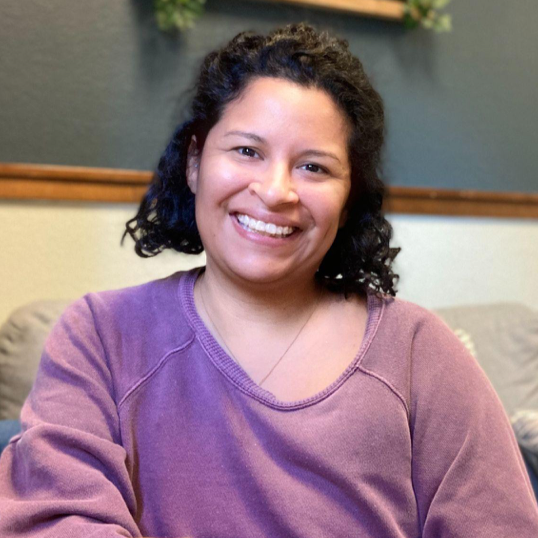
Marisela (Mari) Van Sickle (she/her) has been on the board since 2022. Mari and her husband, Ben, live in SW Portland with their two kids, a 2nd grader at Cottonwood, and a preschooler. Mari joined the board as a way to be active in the community and to bring perspectives as a Woman of Color, BIPOC parent, and a mental health advocate.
Mari brings 10+ years of experience working in child and adolescent mental health and is a Licensed Clinical Social Worker. Currently, she has a private practice in SW Portland and has previously worked in various levels of care ranging from outpatient community mental health to psychiatric inpatient mental health.
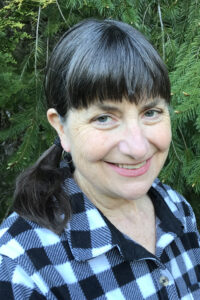 My introduction to this wonderful school was as a parent back in 2009. My child grew up and now is a college student. The mission of CSCS has always been dear to my heart, and I returned in January 2022 to work in the school office.
My introduction to this wonderful school was as a parent back in 2009. My child grew up and now is a college student. The mission of CSCS has always been dear to my heart, and I returned in January 2022 to work in the school office.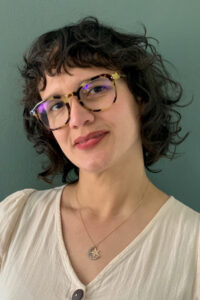 Paola joined CSCS in the fall of 2021 after being a stay-at-home parent to her twins. She graduated with a B.A. in Liberal Studies from San Francisco State University and worked as a Reggio inspired preschool teacher until she transitioned to the role of stay-at-home parent. When her children were toddlers, she started a chapter of Free Forest School in order to connect young children and families to nature. Once her children were of preschool age, she co-created a forest school program in Sacramento, CA. Paola enjoys gardening, food (cooking and seeking out new local options), and exploring Portland with her family.
Paola joined CSCS in the fall of 2021 after being a stay-at-home parent to her twins. She graduated with a B.A. in Liberal Studies from San Francisco State University and worked as a Reggio inspired preschool teacher until she transitioned to the role of stay-at-home parent. When her children were toddlers, she started a chapter of Free Forest School in order to connect young children and families to nature. Once her children were of preschool age, she co-created a forest school program in Sacramento, CA. Paola enjoys gardening, food (cooking and seeking out new local options), and exploring Portland with her family.
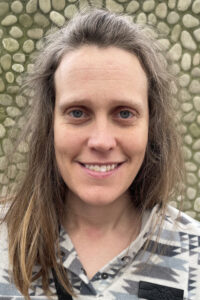 Janelle joined CSCS during the 2021-2022 school year. Before teaching, she was a field scientist in Alaska working for the USGS (United States Geological Survey) and a private consulting firm. Her degree is in Earth Science and Outdoor Studies with a K-8 teaching credential and endorsement in geoscience. Between her science years and teaching years, she also taught outdoor education in California and led wilderness therapy trips in Alaska and Oregon. She enjoys being outside and being a part of the land and feels it is important to instill a sense of place in our students by educating them on who was on this land prior to European colonization. She recently moved up to Oregon from California with her family and their tiny house that they built during the pandemic.
Janelle joined CSCS during the 2021-2022 school year. Before teaching, she was a field scientist in Alaska working for the USGS (United States Geological Survey) and a private consulting firm. Her degree is in Earth Science and Outdoor Studies with a K-8 teaching credential and endorsement in geoscience. Between her science years and teaching years, she also taught outdoor education in California and led wilderness therapy trips in Alaska and Oregon. She enjoys being outside and being a part of the land and feels it is important to instill a sense of place in our students by educating them on who was on this land prior to European colonization. She recently moved up to Oregon from California with her family and their tiny house that they built during the pandemic.
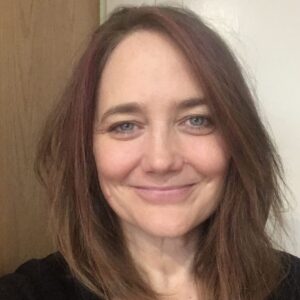 Emily is a passionate explorer… of places, ideas, and what makes people tick. She has been working for the past few years as a Career Coach, helping job seekers navigate the sticky terrain of finding a career fit and snagging their next job opportunity. Before transitioning to career coaching, Emily worked for fourteen years as a university instructor, mainly in the field of World Regional Geography, where she and her students traversed the concepts of human and environment connections in various manifestations across the globe.
Emily is a passionate explorer… of places, ideas, and what makes people tick. She has been working for the past few years as a Career Coach, helping job seekers navigate the sticky terrain of finding a career fit and snagging their next job opportunity. Before transitioning to career coaching, Emily worked for fourteen years as a university instructor, mainly in the field of World Regional Geography, where she and her students traversed the concepts of human and environment connections in various manifestations across the globe.
Outside of paid employment, Emily enjoys spending time (preferably outdoors) with her two daughters and husband, Billie; some of the family’s favorite outdoor activities are backpacking, canoeing, sailing, hiking, and camping. Emily also deeply appreciates stories, is an avid reader and an occasional creator of illustrations.
Emily is excited to be joining the Cottonwood Board where she hopes to put some of her lifelong interests and skills to use to serve the Cottonwood community.
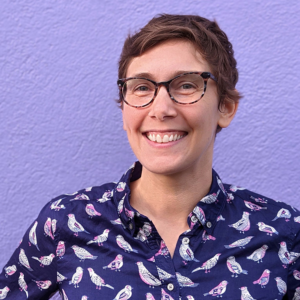 Amy (they/them) is the CEO of NTEN, a Portland-based capacity-building nonprofit that ensures missions and movements are successful through the skillful and equitable use of technology. Amy is also a Cottonwood parent with a daughter in kindergarten.
Amy (they/them) is the CEO of NTEN, a Portland-based capacity-building nonprofit that ensures missions and movements are successful through the skillful and equitable use of technology. Amy is also a Cottonwood parent with a daughter in kindergarten.
Amy is driven by a belief that schools, organizations, and communities can be movement-based forces for positive change. Their prior experience in direct service, policy, philanthropy, and capacity-building organizations has fueled their work to create meaningful, inclusive, and compassionate community engagement and educational opportunities for organizations around the world.
Prior to joining the Cottonwood Board, Amy’s had the privilege to serve on numerous boards and advisory committees for organizations with missions including youth civic engagement, digital equity, and emerging technology. Amy is also the chair of the Open and Accountable Elections Commision in Portland.
We joined CSCS in 2012 and I have been volunteering for various things around the school ever since, including creating promotional material for the school’s annual auction since 2014 and the design of the live auction catalog from 2015-2019. I also worked with another parent to revamp the school’s website when the name of the school was changed from SW Charter to The Cottonwood School. I have been the go-to person for all things related to the school’s website since.
In November of 2017, I was elected to The Cottonwood school board. I had one child enrolled and one who would be soon, so I thought that I would like to have more input on shaping the future of the school. I am currently the chair of the Marketing Committee which oversees the website and search engine marketing as well as press and promotion for events and school activities to help further position the school as an authority in place-based education and promote enrollment.
I am a graphic designer, web designer, web developer and digital marketer.
I normally enjoy going out and listening to live music on a regular basis, but 2020 broke all of that, so I spend more time watching movies and playing cards with my family, doing DIY projects around our new house, playing video games with the kids, practicing playing the drums and keeping up with all of the extra cooking now that we don’t go out anymore. When we go back to some kind of “normal,” I am really looking forward to hanging out with CSCS parents again.
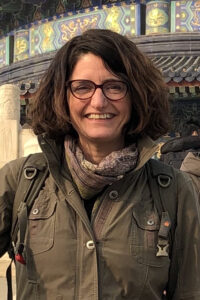
Laura has many years of nonprofit accounting experience, having previously worked at Financial Beginnings, an organization that teaches individuals of all ages how to play an active role in their financial well-being. She has a passion for non-profit work and is dedicated to helping organizations achieve their goals through good financial management. Outside of work, she enjoys eating ice cream.
My family has been a part of the Cottonwood community since 2013 when my older son started Kindergarten here. We were looking for an opportunity to be involved in his education on a deeper level than often comes with a larger neighborhood school. We loved that our son would have a small, nurturing environment that allowed him to explore learning both in the classroom and in the field. We later enrolled our younger son, and he has thrived at Cottonwood for different but equally as valuable reasons, like the personalized attention to his needs and patient, caring staff to help him through any bumps in the road.
By day, I am the project manager for a creative team in the marketing department of a large textiles company. I use my skills from work to help organize and push forward the vast array of projects that help this amazing school continue to grow as thought leaders in the field of Place Based Learning.
In my free time, I love to travel and see live music. I have been using the lockdown time to finish some overdue home renovation projects and adopt a couple of puppies. I am married to my college sweetheart and moved to Portland with him almost 20 years ago from the east coast. Best decision ever. (The move AND the husband!). Deciding to be a part of the Cottonwood community ranks way up there as well!
Scott is the Executive Director of the nonprofit Blanchet House of Hospitality, which provides meals, shelter, and aid to houseless and food insecure individuals in Portland. Although not a Cottonwood parent, Scott has long admired Cottonwood’s mission and unique place-based curriculum. Prior to joining the Cottonwood Board, Scott got a first-hand look at Cottonwood’s classrooms in action while he was the senior program manager at Classroom Law Project, which runs the Project Citizen program that Cottonwood teachers and students enjoy. He brings over two decades of teaching and independent school leadership experience to the Cottonwood board, as well as past board experience, including six years on the board at the nearby language-immersion International School. Scott currently serves on the Old Town Community Association Board. And once in his life, a long long time ago, he practiced as a criminal defense attorney in Texas. Scott and his wife Jill, a med/peds physician, have three children–one out of college, one in college, and one almost there. In his precious free time, Scott and his wife practice being empty-nesters, which during COVID involves a lot of binge watching shows they didn’t have time for before.
I came to Cottonwood in 2017 when my stepdaughter was accepted into the third grade. From the beginning, I was so impressed with the place-based curriculum that I decided to send her younger brother and sister to the school as well. Once it became clear that our family would be a part of Cottonwood for many years, I decided that the best way for me to support the school was to use my previous board experience in home-owner and neighborhood associations and join the board.
Educated at the Oregon Institute of Technology, I am currently working as a web developer full-time. My wife Allison, a naturopathic physician and clinical consultant for a medical lab, and I are currently navigating the craziness of working and doing school for three kids from our home. In my spare time, I am a huge fan of the Portland Timbers and, when not in the middle of a global pandemic, can often be found standing in the famous Timbers Army singing the team on to victory.
I’m proud and privileged to say that we’ve been a Cottonwood family since 2013. From the very beginning, I could feel that this community was itself a precious family worthy of my support. I started my service to the school with the parent organization helping with auctions and have spent the last five years on the Board, serving as President for two years, and currently as Treasurer. I enjoy putting my skills in accounting and governance to use to the benefit of the administration and staff of the school, and ultimately for its students. I am an Accounting Manager at Portland General Electric focusing on Sarbanes-Oxley compliance, a mother of two boys, an all-weather runner, a summertime paddle boarder, and an Airbnb superhost! I draw on my past experiences as a bookkeeper, CPA, internal auditor and Wilson High School cheerleader to volunteer for the unpopular tasks, or find volunteers, to fill in the gaps where needed. I find so much meaning in my board service because it allows me to witness an organization carrying out a mission I deeply believe in and doing so with courage, grit, creativity and passion. I am here in support of the committed and talented teachers and staff because I can see the difference that they make in the lives of the children of Portland and in the broader educational community.
Cottonwood’s place-based curriculum and passion for civic engagement was the foundation for putting our kids at CSCS. I have a son (9) in the third grade, and I have a son (7) in the first grade. We have been part of the CSCS family since my nine-year-old was in kindergarten. After two years of my oldest son attending CSCS and having another son going into kindergarten, I decided to join the Board. Having two strong Black boys at CSCS I wanted to be their voice. Being on the Board this past year has given me that opportunity. Currently, I am attending Portland State University in my last year towards a Bachelor’s Degree in Communications. I also have an Associate Degree in Business Administration. My current goal, especially after this past year, is to be a Diversity Advocate for grade-school level students. I believe every child from a diverse background should have someone advocating for them in the school system.
I moved around a lot as a child, throughout the Portland and Vancouver area, and I know first-hand as a minority how hard it is to be a student in a school system embedded on systemic racism. The amazing thing about Cottonwood, particularly after this traumatic year we had, is seeing our school really stepping up. Seeing the growth, the support, and strength this past year at CSCS makes me proud to be part of such an amazing school and serving on the Board.
In my spare time, my family and I love going to the Coast spending time relaxing with an ocean view. I enjoy writing poetry. My family and I love having dance parties in our living room. Even though I lived in the Northwest most of my life, I like taking adventures and finding new gems right in our very own backyard. I love to read books; sometimes I will finish a whole book in one day. I also love watching movies of all genres, and if I could spend a Saturday binge watching and eating popcorn all day I would. What I love most is being with family and having some good, old-fashioned family fun.
I am a neurodivergent Jersey girl-turned-Portlander, avid reader and writer, and believer in all things local. Cottonwood’s focus on place-based education inspired me to join the board.
Leadership isn’t something that came naturally to me; all my teachers branded me as extremely shy as a child. I’ve always preferred working behind the scenes and amplifying others’ voices, and my role on this board allows me to do both. I worked as a local journalist prior to starting a literary publishing house, Forest Avenue Press, in 2012. I believe in the power of storytelling and use my skillset to help with Cottonwood publicity and marketing campaigns.
I have a degree from Vassar College and a certificate from the Yale Publishing Course, which I attended in 2018 thanks to a scholarship from the Independent Book Publishers Association. I’m a proud member of the Anxiety Society, supporting the Create More, Fear Less nonprofit founded right here in Portland to help students use art and imagination to work through their worries.
 Jake comes to us with great experiences and passion that directly relate to this diverse position. Over the years, through work with Playworks, at a Montessori school, Outdoor School and with the Boy Scouts, Jake has gained experience in teaching games, delivering lessons, and actively keeping kids engaged in fun, physical movement. He has had the opportunity to build skills that support children’s social emotional well being alongside their physical health.
Jake comes to us with great experiences and passion that directly relate to this diverse position. Over the years, through work with Playworks, at a Montessori school, Outdoor School and with the Boy Scouts, Jake has gained experience in teaching games, delivering lessons, and actively keeping kids engaged in fun, physical movement. He has had the opportunity to build skills that support children’s social emotional well being alongside their physical health.
 Joe joined the staff as a long-term substitute in the Winter of 2020. He received his Bachelor’s degree from Rutgers University, and his Master’s of Art in Teaching from SUNY Cortland in 2010. He is a passionate reader, writer, and outdoor adventurer who has been teaching and exploring the Pacific Northwest for the past ten years. In addition to several years working with underserved and homeless youth in downtown Portland, Joe has also taught at an American International School in Guatemala City. Joe feels that successful educators must be constantly searching for newer and better ways to connect with and engage their students and be willing to meet and interact with young people in the spaces that they find comfortable. This means being tech savvy and culturally aware, but it also means simply having the confidence and the integrity to treat all people with respect, and approach every learning opportunity with an open mind. He is looking forward to learning more about place-based learning as the year proceeds.
Joe joined the staff as a long-term substitute in the Winter of 2020. He received his Bachelor’s degree from Rutgers University, and his Master’s of Art in Teaching from SUNY Cortland in 2010. He is a passionate reader, writer, and outdoor adventurer who has been teaching and exploring the Pacific Northwest for the past ten years. In addition to several years working with underserved and homeless youth in downtown Portland, Joe has also taught at an American International School in Guatemala City. Joe feels that successful educators must be constantly searching for newer and better ways to connect with and engage their students and be willing to meet and interact with young people in the spaces that they find comfortable. This means being tech savvy and culturally aware, but it also means simply having the confidence and the integrity to treat all people with respect, and approach every learning opportunity with an open mind. He is looking forward to learning more about place-based learning as the year proceeds.
 Natalie recently graduated from Oregon State, grew up in Coos Bay, and is an avid horsewoman. We are excited to have her with us full time as a PE Teacher and Recess/Classroom Aid.
Natalie recently graduated from Oregon State, grew up in Coos Bay, and is an avid horsewoman. We are excited to have her with us full time as a PE Teacher and Recess/Classroom Aid.
 Daniel has a Masters in Education from Portland State University. He spent last year in a 4/5 classroom at MLC where he gained experience with this age group, used the Storyline Method during several projects, infused the school day with music, and more. He is passionate about incorporating the arts into each school day; He plays guitar for the children every day and has begun a novel writing project with the class. He has been hard at work building solid routines in math and other areas of classroom life.
Daniel has a Masters in Education from Portland State University. He spent last year in a 4/5 classroom at MLC where he gained experience with this age group, used the Storyline Method during several projects, infused the school day with music, and more. He is passionate about incorporating the arts into each school day; He plays guitar for the children every day and has begun a novel writing project with the class. He has been hard at work building solid routines in math and other areas of classroom life.
 Her teaching journey actually began at our school as a student teacher for Sarah Anderson while earning her Master’s in elementary education at Antioch University. While there she specialized in integrated learning with an emphasis on science and environmental education. She has spent the last four years teaching a blended 2/3 class at Trillium Charter School where she has been committed to creating engaging and relevant projects that connect students to their place. She is passionate about building strong relationships with students and creating a collaborative and inclusive classroom community. We are glad to have her back at our school.
Her teaching journey actually began at our school as a student teacher for Sarah Anderson while earning her Master’s in elementary education at Antioch University. While there she specialized in integrated learning with an emphasis on science and environmental education. She has spent the last four years teaching a blended 2/3 class at Trillium Charter School where she has been committed to creating engaging and relevant projects that connect students to their place. She is passionate about building strong relationships with students and creating a collaborative and inclusive classroom community. We are glad to have her back at our school.
 Emily Conner joined Southwest Charter in 2016 as our 7/8 Humanities teacher. Emily has a Masters in Teaching at Lewis & Clark, where she focused on social justice education and promoting an inclusive and inquiring classroom community. Her interest in place-based education began when she lived in Alabama, working toward her MFA in creative writing and farming in Coker on weekends. In her free time, Emily likes to bake bread, doodle, and go on long walks with audiobooks and her dog Ellie.
Emily Conner joined Southwest Charter in 2016 as our 7/8 Humanities teacher. Emily has a Masters in Teaching at Lewis & Clark, where she focused on social justice education and promoting an inclusive and inquiring classroom community. Her interest in place-based education began when she lived in Alabama, working toward her MFA in creative writing and farming in Coker on weekends. In her free time, Emily likes to bake bread, doodle, and go on long walks with audiobooks and her dog Ellie.
 Chris joined the staff as the 7/8 Math and Science teacher in 2014. Chris received his Bachelor’s degree in Biology Education from Ithaca College. He has completed Master’s level work in Educational Technology at Walden University. He spent four years teaching Middle School science at Lower Manhattan Community School in New York City. Chris feels that every interaction and situation presents an opportunity to learn. He has a passion for outdoor education and learning through community. Chris believes that knowing the children we teach is as important as knowing the content we teach.
Chris joined the staff as the 7/8 Math and Science teacher in 2014. Chris received his Bachelor’s degree in Biology Education from Ithaca College. He has completed Master’s level work in Educational Technology at Walden University. He spent four years teaching Middle School science at Lower Manhattan Community School in New York City. Chris feels that every interaction and situation presents an opportunity to learn. He has a passion for outdoor education and learning through community. Chris believes that knowing the children we teach is as important as knowing the content we teach.
 Melissa studied early childhood education before having her own children and moving from California to Oregon in 2012. She worked for several children’s art companies including Kiwi Crate where she designed over 400 of their art tutorials and wrote for their child centered art blog. Melissa’s oldest child started at CSCS her kindergarten year in 2012 and Melissa naturally fell into the art program of CSCS by volunteering in a parent-led art program for two years before coming on board officially as the k-5th grade art instructor in 2015. When she is not teaching art at school and hanging art throughout the halls, Melissa leads a girls group, enjoys cooking, painting and spending time with her family. Coming from a family of 9 siblings she thrives around the energy and the children at CSCS.
Melissa studied early childhood education before having her own children and moving from California to Oregon in 2012. She worked for several children’s art companies including Kiwi Crate where she designed over 400 of their art tutorials and wrote for their child centered art blog. Melissa’s oldest child started at CSCS her kindergarten year in 2012 and Melissa naturally fell into the art program of CSCS by volunteering in a parent-led art program for two years before coming on board officially as the k-5th grade art instructor in 2015. When she is not teaching art at school and hanging art throughout the halls, Melissa leads a girls group, enjoys cooking, painting and spending time with her family. Coming from a family of 9 siblings she thrives around the energy and the children at CSCS.
 Morgen came to CSCS in 2016 from the Creative Science School in Portland. Prior to her time at Creative Science, Morgen received her master’s degree in Education from Portland State University and had the opportunity to teach in a variety of educational settings as a substitute teacher for Portland Public Schools. She has experience with the Storyline method and strives to find authentic and engaging ways to integrate grade level content across the curriculum. An avid fan of the game of soccer (football), Morgen enjoys playing weekly on her adult co-ed team and also looks forward to attending Portland Timbers games with her husband and son. As a native Portlander, she also loves a variety of outdoor activities including hiking, biking, and snowboarding.
Morgen came to CSCS in 2016 from the Creative Science School in Portland. Prior to her time at Creative Science, Morgen received her master’s degree in Education from Portland State University and had the opportunity to teach in a variety of educational settings as a substitute teacher for Portland Public Schools. She has experience with the Storyline method and strives to find authentic and engaging ways to integrate grade level content across the curriculum. An avid fan of the game of soccer (football), Morgen enjoys playing weekly on her adult co-ed team and also looks forward to attending Portland Timbers games with her husband and son. As a native Portlander, she also loves a variety of outdoor activities including hiking, biking, and snowboarding.
 Elizabeth joined CSCS in 2016. She recently graduated with a MAT from the Arbor Center for Teaching in conjunction with Marylhurst University. As part of this program, she had the privilege of co-teaching for two years in a K-1 classroom at the Arbor School of Arts and Sciences, as well as teaching language arts and math units in a 5th grade at Stafford Elementary in West Linn. When she’s not in the classroom, you can this native Portlander singing in choirs, cooking, gardening, writing, and hiking.
Elizabeth joined CSCS in 2016. She recently graduated with a MAT from the Arbor Center for Teaching in conjunction with Marylhurst University. As part of this program, she had the privilege of co-teaching for two years in a K-1 classroom at the Arbor School of Arts and Sciences, as well as teaching language arts and math units in a 5th grade at Stafford Elementary in West Linn. When she’s not in the classroom, you can this native Portlander singing in choirs, cooking, gardening, writing, and hiking.

Angie 2017-18
Angie joined CSCS in fall 2016 and came to us after teaching a first, second, and third grade blend at The Ivy School in Portland. Originally from Southeast Idaho, Angie moved to Portland in 2005 and later earned her Masters of Education from Portland State University. Angie has held a variety of roles in education from coaching to being an instructor at Mad Science, but has especially enjoyed working with young children. She loves their strong sense of curiosity and contagious joy for life. Angie’s commitment to crafting learning experiences that are hands-on and require creative thinking have found a natural fit in place-based education and the Storyline method. When not teaching, Angie loves to fill her time with reading, painting, kayaking, and catching up with friends and family.

Noelle joined Cottonwood in the fall of 2017. In the six years prior, she taught pre-k thru third grade in both public and private school settings. Noelle also teaches acting classes at Oregon Children’s Theater. Noelle received both her BA and MAed from Portland State University. When she isn’t teaching, she spends her time acting on stage and in film, camping, backpacking, hiking, and adventuring with her dog, Lady Bird.
 Nesa joined the teaching team at CSCS in fall 2014 and has loved being a part of this amazing community ever since! Nesa is passionate about Place-Based Education and has been working on the grant committee to help other teachers learn about and implement PBE curriculum. She also uses the Scottish Storyline method, an integrated approach to teaching, in her classroom which leads to many engaging activities such as building a volcano and creating a restaurant in the classroom. Nesa received her B.A. in Drama from Vassar College in New York and incorporates her love of performance into the classroom by allowing her students to explore creatively and learn by doing. Originally from Eugene, Nesa returned to Oregon after living on the east coast and received her Masters in Education from Portland State University. Nesa has loved being a teacher of young students immensely. She loves getting to know her students, discovering their strengths and talents, and overcoming challenges together as a classroom and school community. Outside of teaching, Nesa enjoys being in nature, traveling, Balkan folk dancing, dancing in general, and 90s sing-along parties.
Nesa joined the teaching team at CSCS in fall 2014 and has loved being a part of this amazing community ever since! Nesa is passionate about Place-Based Education and has been working on the grant committee to help other teachers learn about and implement PBE curriculum. She also uses the Scottish Storyline method, an integrated approach to teaching, in her classroom which leads to many engaging activities such as building a volcano and creating a restaurant in the classroom. Nesa received her B.A. in Drama from Vassar College in New York and incorporates her love of performance into the classroom by allowing her students to explore creatively and learn by doing. Originally from Eugene, Nesa returned to Oregon after living on the east coast and received her Masters in Education from Portland State University. Nesa has loved being a teacher of young students immensely. She loves getting to know her students, discovering their strengths and talents, and overcoming challenges together as a classroom and school community. Outside of teaching, Nesa enjoys being in nature, traveling, Balkan folk dancing, dancing in general, and 90s sing-along parties.


